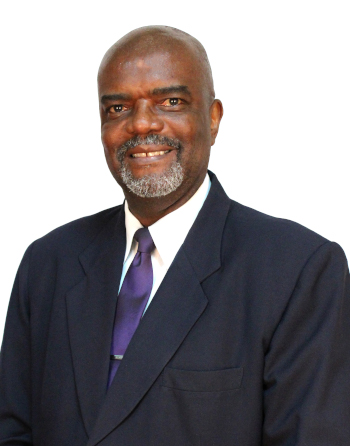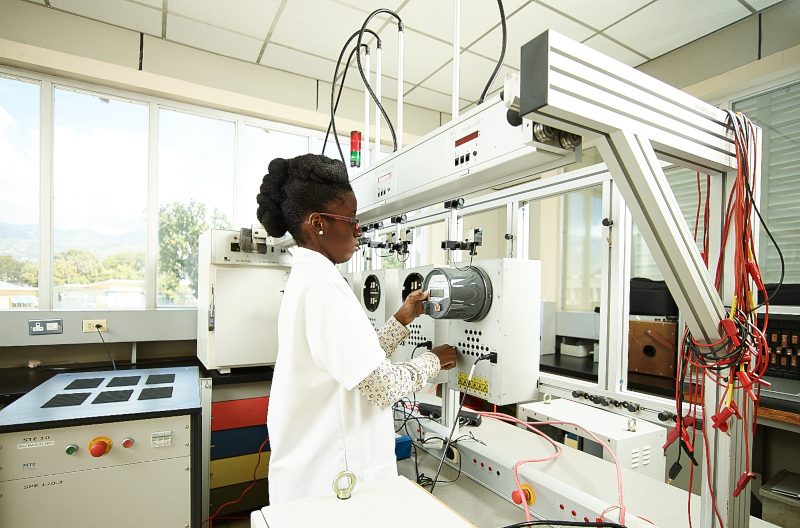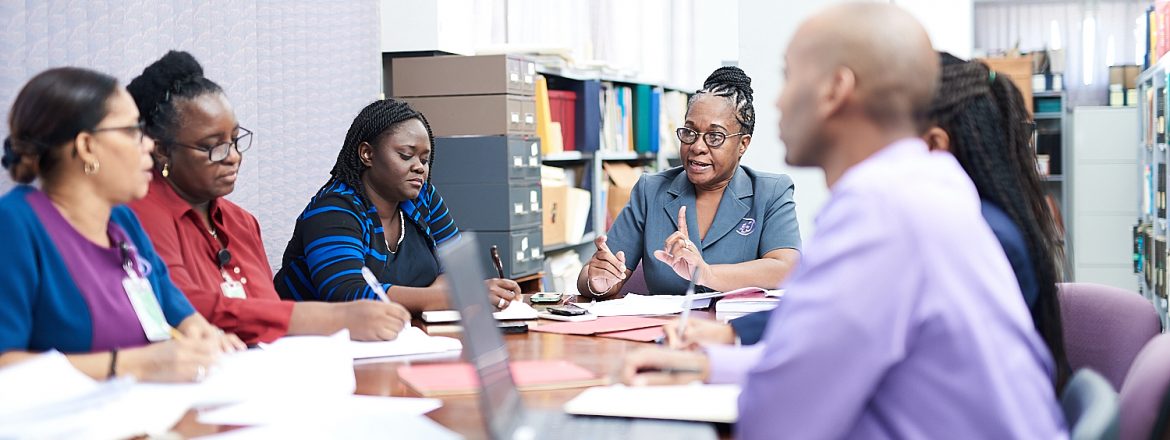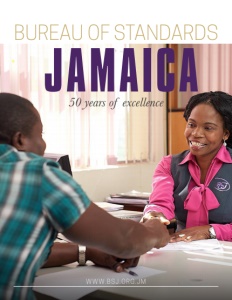Bureau of Standards Jamaica
50 years of excellence
Business View Caribbean interviews Hopeton Heron, Executive Director of the Bureau of Standards Jamaica, for our focus on Entrepreneurialism & Trade in Jamaica.
Celebrating half a century of excellence in 2019, the Bureau of Standards Jamaica (BSJ) continues to play a vital role in facilitating trade, training, and encouraging entrepreneurial spirit throughout the Island of Jamaica. BSJ is a statutory body established by The Standards Act of 1969 to promote standardization in relation to commodities, processes, and practices. Over the years, that role has expanded into conformity assessment (certification, testing, and calibration) and metrology.
Today, the Bureau’s main activities are: facilitating development of standards and compliance requirements for particular commodities, services, practices, and processes; monitoring for compliance; conducting tests and calibrating instruments; certifying products and management systems; providing industrial training; and promoting research and education in standardization. The portfolio includes ensuring compliance with The Standards Act (1968), The Processed Food Act (1959) and the Weights and Measures Act (1976). Other aspects of its mandate are implemented under The Trade Act (1955), The Customs Act (1941), The Petroleum (Quality Control) Regulations (1990), and The CARICOM Regional Organization for Standards and Quality Act (2005).

Hopeton Heron, Executive Director
An agency of the Ministry of Industry, Commerce, Agriculture & Fisheries (MICAF), the Bureau is governed by a 14-member Standards Council comprised of a Chairman, Director of Standards (Executive Director), and 12 stakeholder group representatives appointed by the Minister. To glean information and insight into the past, present, and future of the Bureau, Business View Caribbean spoke with BSJ Executive Director, Mr. Hopeton Heron. The following is an edited transcript of that conversation.
BVC: Congratulations on the 50th anniversary! Could you provide some background on BSJ and how it has evolved?
Heron: “Thank you! It came about after Jamaica got Independence in 1962. During that decade, institutions were being built out to set up our infrastructure for global trade, etc. The Bureau of Standards was set up in 1969 to facilitate trade, both locally and internationally. At that time, the Bureau did everything – inspected goods, made regulations, tried to facilitate trade, did training, tried to do certification, accreditation. But with the WTO (World Trade Organization), the requirements for infrastructure for trade changed.
“The first entity to break off from what was then the Jamaica Bureau of Standards was the accreditation body, JANAAC (Jamaica National Agency for Accreditation). Later on, when it was recognized we were training people to be certified, and doing the certification, the National Certification Body of Jamaica (NCBJ) was formed. It now provides certification for ISO quality management systems; we are now at 9001:2015. In 2016, the National Compliance & Regulatory Authority (NCRA) was formed. So, over 50 years, the Jamaica Bureau of Standards morphed into four entities that build out the national quality infrastructure, which satisfies and agrees with WTO rules, in that regard. One independent body does accreditation, another does certification, another does compliance and regulations, and the Bureau of Standards Jamaica is now left with facilitating trade for entrepreneurs, manufacturers, exporters, anyone trading locally and internationally.”
BVC: How do you facilitate trade for such a wide business spectrum?
Heron: “We prepare them by developing standards for our own use, but we’re also cognizant that there are many standards globally. We adopt those standards that can be adapted for Jamaica because it makes no sense to reinvent the wheel. The Bureau has developed a Client Services program where we invite entrepreneurs through our doors to show them how the standards can be used and how they can be ready for trade and product development. Beyond that, we do conformity assessment to deal with laboratory tests. We have a fully functional chemistry lab and microbiology lab which are accredited. We have a packaging lab and also labelling standards that we prepare. And this we share with our entrepreneurs and manufacturers through our Client Services program. All the standards are kept in our Technical Information Center and can be bought through the TIC.
“The Bureau, itself, has 165 employees. The NCRA, NCBJ, and BSJ (not JANAAC) all share common corporate services – communications, customer service, IT, Human Resource, Finance, and Legal. The benefit is the common overhead for housing those services. All four entities are based in Kingston at the crossroads of the same landmark, but we each have a different entrance and therefore a different address. Plus there are regional offices in Montego Bay, Ocho Rios, Mandeville, and Savanna-la-Mar.”

BVC: Do you have initiatives especially for entrepreneurs?
Heron: “We have different programs from time to time. The latest one is with the Jamaica Promotions Corporation (JAMPRO), a government agency of MICAF that promotes business opportunities in export and investment to the local and international private sector. They have launched Export Max III, and will provide us with around 50 entrepreneurs who we’ll work with in our client services program. Occasionally, we partner with other bodies, such as the Jamaica Business Development Corporation (JBDC) and Jamaica Agro Processors Association, as well.
“From our advertisements and the statements we make in public, we really do tell persons what we do. We also make presentations and speak to the Jamaica Chamber of Commerce and the Jamaica Institute of Engineers. And the Jamaica Manufacturers & Exporters Association – they are our biggest stakeholders at this time, because most of the major manufacturers and exporters are registered members with them. So, we are in a network where we can access persons that we need to extend our client services to, and prepare them with a better product for trade, built to withstand the Jamaican name of quality and standards.”
BVC: Is the Bureau involved with emerging agricultural industries such as cannabis?
Heron: “Yes. The Cannabis Licensing Authority (CLA) was established in 2015 with a specific role to establish and regulate Jamaica’s legal ganja and hemp industry. Jamaica has producers in the cannabis sector that are set up with the CLA, and that has far-reaching impact for agriculture. Therefore, there are standards and different labs for that – the Bureau being one, and the university lab, and we do collaborate. We are on the Cannabis Licensing Technical Committee and team, and a lot of work is being done. We are adopting some ASTM International standards for ourselves, and preparing the industry for trade. We seek authorization from the Licensing Authority to handle the product, so we can do chemical testing. We have been doing some of that and we really fall in line with the rules outlined by the CLA.
“Another product that is emerging and doing very well is bamboo, which has many strains and a wide range of uses. With the banning of plastics, there are bamboo products being developed, which can substitute for a number of things that plastics used to do. We are part of the Bamboo Industry Association; we take leadership roles and train their people. And we are developing standards so these new products can be built to standard. A certain stage of the bamboo can be used as a vegetable; another version can be used for furniture, or straws, or plates – things that used to be made from plastic.
“Product diversity is what is required. That these industries will spring off and not make the mistakes of coming on with bad products, because it would be aligned so standards that recognize international requirements for trade are met. Once you can satisfy the local market and your product is built to standard, you are ready to trade. If that is done, the Jamaican economy stands well. We have a special project unit supporting the bamboo industry – doing training, marketing, and also tapping into the global requirements, so we can stay ahead of the game.”
BVC: What challenges are at the forefront right now and what are the Bureau’s goals for the near-term future?
Heron: “Well, locally and regionally, there has been big talk about front of package labelling. The health sector felt it was important to focus on non-communicable diseases that the region suffers from, such as diabetes, obesity (in children, and generally). So the region was challenged to come up with something to impact these diseases. One of the items was front of package labelling and there was big discussion between the manufacturers and the national standards bodies about how much information you put on the label, because a nutritional label is there, anyway, and whether you should add an alert or not. The manufacturers think that putting an alert on the front of their package is not trade-friendly. And the health sector believes that people should see what is in the product. The good thing is the parties are working together and, hopefully, they’ll come to a consensus.
“As for our goals, the word is out but we need to get more people to recognize the benefits of having their goods tested and proven for trade. We need them to understand the value of a tested product because, when they go through our certified lab, they can access markets internationally. So, you may be good for your community, good for local trade, but you want to know that to go into a North American market or European market, you do that by getting your product lab-certified and accredited. If we can increase the amount of participants in global trade with products that are accepted worldwide because it has a Jamaican trademark proving it has been through the Bureau’s rigor, then that is our one- to-three-year goal: to increase trade and give confidence in our traders.”
AT A GLANCE
Who: Bureau of Standards Jamaica
What: Statutory body for the facilitation of trade, training, and conformity assessment.
Where: Kingston, Jamaica
Website: www.bsj.org.jm






 This information will never be shared to third parties
This information will never be shared to third parties